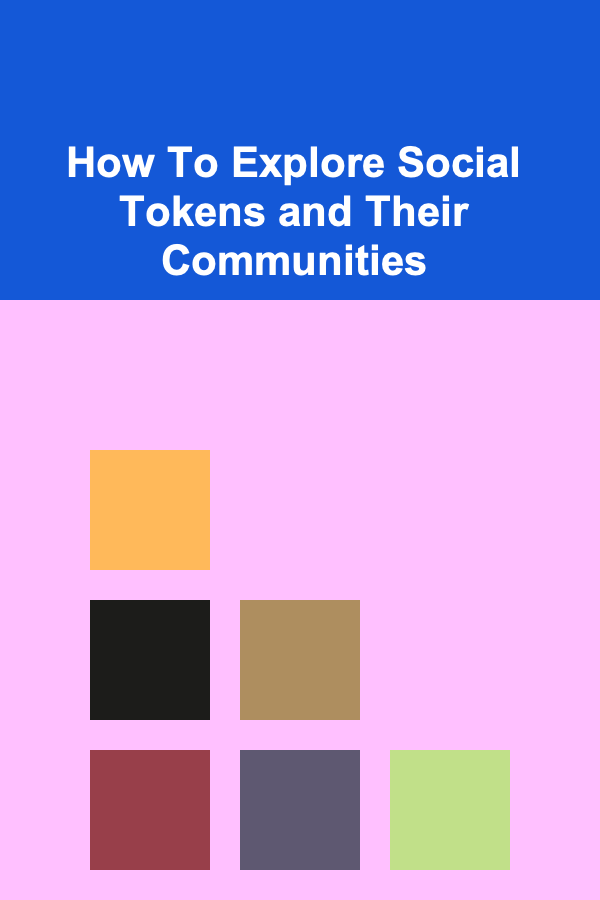
How To Explore Social Tokens and Their Communities
ebook include PDF & Audio bundle (Micro Guide)
$12.99$5.99
Limited Time Offer! Order within the next:

In recent years, the world of cryptocurrency has expanded beyond its traditional uses in finance. A new wave of digital assets has emerged, offering unique opportunities for communities to interact, engage, and grow together. These digital assets are called social tokens, and they are reshaping how we think about online interactions, communities, and value exchange.
What Are Social Tokens?
Social tokens are digital assets or cryptocurrencies that represent some form of value within a specific community or ecosystem. Unlike traditional cryptocurrencies like Bitcoin or Ethereum, which are designed primarily for financial transactions, social tokens are more focused on social capital, content creation, and community-driven initiatives.
A social token can be tied to a person, group, project, or brand. They enable creators, influencers, artists, and communities to monetize their engagement and interactions in a more decentralized and direct way. Essentially, they allow users to create their own economies that are centered around social engagement rather than purely financial activity.
The Rise of Social Tokens: Why Now?
The rise of social tokens is closely linked to the broader adoption of blockchain technology and decentralized finance (DeFi). Blockchain technology, which underpins cryptocurrencies, offers a way to create trustless systems without intermediaries. In the context of social tokens, this means that communities can operate more autonomously, with transactions being transparent, secure, and immutable.
A few factors have contributed to the rapid growth of social tokens:
- Influencer Culture: As influencers and content creators amass large followings, they seek new ways to monetize their fanbases beyond traditional ad revenues or brand deals. Social tokens provide a new avenue for fans to support their favorite creators directly.
- Decentralized Finance (DeFi): The DeFi ecosystem has created a new financial landscape where individuals have greater control over their wealth and assets. Social tokens fit perfectly into this ecosystem, allowing users to create their own communities with their own currencies.
- Community Building: There is a growing desire for community-centric platforms where users are rewarded for their engagement and contributions. Social tokens give communities the ability to self-govern, monetize interactions, and engage in meaningful exchanges that benefit all participants.
Types of Social Tokens
Social tokens can come in various forms, depending on their purpose and the goals of the community they serve. Below are some of the most common types of social tokens:
- Creator Tokens: These are tokens issued by individual creators, influencers, or artists. They allow creators to directly engage with their audience and reward fans for their support. For example, musicians might issue creator tokens that offer fans exclusive content, behind-the-scenes access, or the ability to participate in decision-making processes like song choices.
- Community Tokens: These tokens represent a broader group or organization, such as a fan club, non-profit, or digital community. These tokens can be used for community governance, voting on important decisions, and incentivizing engagement. Holders of community tokens often have special privileges within the community, such as exclusive access to events, content, or voting on important issues.
- Brand Tokens: Companies and brands are increasingly experimenting with social tokens to enhance brand loyalty and create new ways for customers to engage with their products. These tokens can be used as a form of reward, allowing customers to earn discounts, exclusive products, or services.
- Event Tokens: Some communities issue event-specific tokens to represent participation in a particular event. These can be used for things like access to virtual conferences, live streams, or physical gatherings. Event tokens allow users to gain entry to exclusive events or interact with participants in new ways.
- Governance Tokens: Many social tokens also play a key role in the governance of decentralized platforms and communities. Governance tokens allow holders to participate in decision-making processes, voting on changes to the platform, or the direction the community should take.
How Social Tokens Work
At their core, social tokens are built on blockchain technology, primarily Ethereum or other compatible blockchains like Solana or Binance Smart Chain. These tokens are often created using ERC-20 or ERC-721 standards, which allow them to be traded or exchanged across decentralized platforms.
The functionality of a social token typically revolves around the following:
- Issuance: The token is created and issued by a person, group, or community. This is often done through an initial coin offering (ICO) or a decentralized autonomous organization (DAO), where early supporters can purchase or earn tokens.
- Utility: Social tokens serve as a medium of exchange within the community. Depending on the token's structure, holders may be able to exchange it for goods, services, or access to special content.
- Governance: Many social tokens give holders the power to participate in community decisions. This could range from voting on how the token is distributed to making decisions about content creation, partnerships, or community initiatives.
- Incentivization: Social tokens often have mechanisms built in to encourage engagement, such as rewarding participants with tokens for contributing content, attending events, or supporting the creator.
- Liquidity: Like other cryptocurrencies, social tokens can be traded on various decentralized exchanges (DEXs) or centralized exchanges. However, because they are tied to specific communities or creators, their liquidity can sometimes be limited compared to more widely known cryptocurrencies.
Exploring Communities Around Social Tokens
To fully explore social tokens, it's important to understand the communities that they serve. These communities are the backbone of social tokens, and their success largely depends on active participation and engagement. Here's how to explore social tokens within these communities:
1. Join the Community
The first step in exploring social tokens is to immerse yourself in the community. This can often be done through online platforms such as Discord, Twitter, Telegram, or even the community's own website. Many creators and communities maintain active social media profiles where they share updates, announcements, and events.
Joining these communities can give you insight into the token's value, how it's used, and how participants are engaging with the ecosystem. You can also gain an understanding of the token's utility and whether it aligns with your interests or goals.
2. Participate in Governance
One of the most exciting aspects of social tokens is the ability to participate in governance. If the community offers governance tokens, holders can vote on various proposals, shape the direction of the community, and help make important decisions. Participating in governance is a way to have a voice in the community and influence how the token is used.
3. Engage with Content
Creators often reward their fans for engaging with content, whether that's through liking posts, commenting, or sharing. By engaging with the content, you not only increase the value of the social token but also build stronger relationships with the creator and the community. Some communities even offer rewards for specific actions, like creating content or contributing ideas.
4. Understand the Tokenomics
Tokenomics refers to the economic model of a token, including how it's issued, distributed, and used within a community. It's important to understand the tokenomics of any social token you're exploring, as this will give you insight into the sustainability of the token's value. Key things to consider include:
- Supply and Demand: How many tokens are in circulation? Is there a limit to the number of tokens that can be minted?
- Incentives: What incentives are in place for holding or using the token? Are there rewards for long-term holders?
- Liquidity: Is the token easily tradable? Are there platforms where you can exchange it for other tokens or fiat currency?
5. Support the Creator or Brand
The success of social tokens is often closely tied to the success of the creator, brand, or community behind them. By supporting the creator, whether through purchasing tokens or engaging with their content, you help to drive the growth of the community. The more active and engaged the community is, the more valuable the token becomes.
Challenges and Risks of Social Tokens
While social tokens offer exciting new possibilities, they also come with their own set of challenges and risks:
- Volatility: Like other cryptocurrencies, social tokens can be highly volatile. Their value can fluctuate based on the creator's popularity, market demand, or shifts in the community's direction.
- Regulatory Uncertainty: The regulatory environment surrounding cryptocurrencies is still evolving. Governments around the world are considering how to regulate cryptocurrencies and tokens, which could impact the future of social tokens.
- Community Management: The success of social tokens relies on strong community management. If the creator or community fails to foster engagement or manage conflicts, the token's value can decrease significantly.
- Liquidity Issues: Depending on the token's popularity and demand, liquidity can be a concern. It may be difficult to exchange social tokens for fiat or other cryptocurrencies if there is limited demand.
Conclusion
Social tokens represent a revolutionary shift in how we think about digital assets, communities, and value exchange. They allow creators, influencers, and communities to build decentralized economies where participants are rewarded for their contributions and engagement. Exploring social tokens involves not only understanding their technical aspects but also immersing yourself in the communities they serve. By actively participating in governance, engaging with content, and supporting creators, you can become a valuable part of the ecosystem and help shape the future of social tokens.

Becoming a Successful CFO Assistant: Essential Skills for Supporting Financial Leadership
Read More
How to Use a Checklist to Measure Your Goal Progress: An Actionable Guide
Read More
How to Use Deep Learning to Make Money in the Data Science Field
Read More
Research Scientist's Handbook: Best Practices for Managing Research Projects and Collaborations
Read More
How To Build a Basic Skincare Routine for Beginners
Read More
10 Tips for a Flawless Scholarship Application Checklist
Read MoreOther Products

Becoming a Successful CFO Assistant: Essential Skills for Supporting Financial Leadership
Read More
How to Use a Checklist to Measure Your Goal Progress: An Actionable Guide
Read More
How to Use Deep Learning to Make Money in the Data Science Field
Read More
Research Scientist's Handbook: Best Practices for Managing Research Projects and Collaborations
Read More
How To Build a Basic Skincare Routine for Beginners
Read More